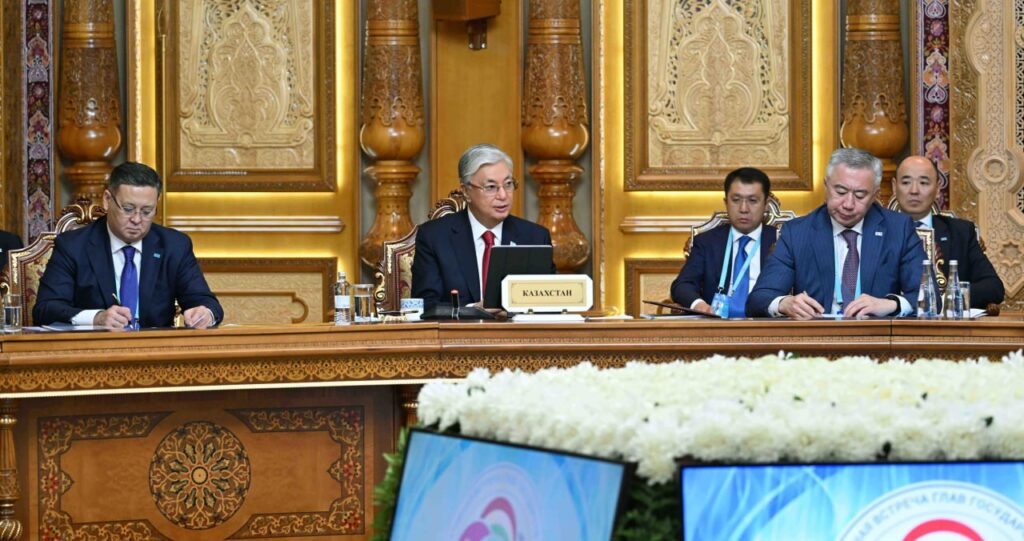ASTANA – Kazakhstan remains steadfast in its commitment to strategic, multifaceted cooperation with all Central Asian countries, President Kassym-Jomart Tokayev said at the fifth Consultative Meeting of the Heads of State of Central Asia on Sept. 14, reported the Akorda press service.
The President acknowledged the success of previous consultative meetings, which became an effective platform facilitated by proactive and trustworthy political dialogue that resolves any issues constructively.
According to Tokayev, intraregional trade turnover has increased by over 80% to $10.6 billion over the past five years. He emphasized that intensifying business contacts, multiplying joint ventures, and large regional projects bring tangible mutual benefits, reshaping the Central Asian economy.
“It is important to jointly confront contemporary threats and look for ways to address emerging problems. Most likely, the next decade will be decisive for our region,and its trajectory depends solely on how effectively we will use this historic chance,” he said.
Prioritizing to maximize economic opportunities in trade, investment, business, science, and innovation, Tokayev outlined key areas of joint work.
Consistent increase in trade flows
The President underlined the potential to increase mutual trade between the countries to $15 billion, stating that Kazakhstan could increase its exports in 175 non-oil commodity items.

Following the summit, the Presidents signed a joint statement on the outcomes of the fifth Consultative Meeting of the Heads of State of Central Asia, an agreement on the general directions of youth policy, and agreement to strengthen land transport connection. Photo credit: Akorda.
With a focus on creating a favorable environment for businesses, Tokayev proposed to establish a unified electronic database of commodity producers, for example, within the Central Asia Gateway portal.
Industrial cooperation
Considering the significant potential of creating cluster cooperative projects for producing food, light, construction, and chemical goods, the President offered to develop an action plan for industrial cooperation among Central Asian states to form a closed production cycle for certain goods with export potential to third-country markets.
Realizing transport and logistics potential
Tokayev highlighted the major advantage of Central Asia’s location at the crossroads connecting global North and South, West and East. He noted the importance of the Trans-Caspian International Transport Route, where traffic volumes can be increased fivefold.
The President stated that Kazakhstan intends to strengthen its position as Eurasia’s transit hub, striving to accelerate large railway and road projects that will contribute to expanding economic ties with its closest partners.
Digital transformation
Given the predictions that up to 70% of global products and services will be based on digital platforms within a decade, the unprecedented development of AI requires transforming the sphere of production, the labor market, and services, Tokayev stated.
He noted Kazakhstan’s progress in digital solutions, with the share of non-cash transactions reaching 82% and the government providing over 90% of services electronically. The country aims to increase IT industry exports to $1 billion by 2026, encouraged by a fivefold increase last year.
Deepening cultural and humanitarian cooperation
Kazakhstan is developing inter-university cooperation with Central Asian countries, with branches of Kazakh universities opened in the Kyrgyz Republic last year, and plans for establishing joint faculties in Tajikistan and Uzbekistan.
“We have a great opportunity to show the whole world the unique natural beauty and distinct cultures of our countries, jointly promoting the Central Asian tourism brand,” Tokayev said.
Information space
The President called for regular dialogue between news agencies of Central Asian countries to initiate joint high-quality media projects, including a regional TV channel and news websites.
As geopolitical tensions escalate, Tokayev emphasized the need to foster stability, security, and sustainable progress in the region. He prioritized expediting the Treaty on Friendship, Good-Neighborliness, and Cooperation for the Development of Central Asia in the 21st Century, which sets out a mutually acceptable formula for achieving this shared objective.
Following the summit, the Presidents signed a joint statement on the outcomes of the fifth Consultative Meeting of the Heads of State of Central Asia, an agreement on the general directions of youth policy, and an agreement to strengthen land transport connectivity in Central Asia.
Remarks were also delivered by President of the Kyrgyz Republic Sadyr Japarov, President of Tajikistan Emomali Rahmon, President of Turkmenistan Serdar Berdymukhamedov, and President of Uzbekistan Shavkat Mirziyoyev. Azerbaijan’s President Ilham Aliyev was invited as an honorary guest.
Source: astanatimes


